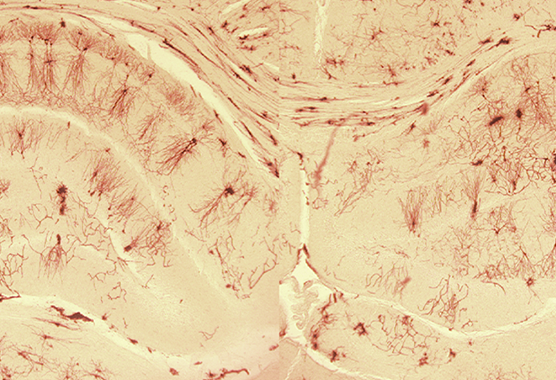Gene Gurkoff, Ph.D., uses rodent models to investigate changes in neural connectivity and activity using EEG and depth electrode recordings following traumatic brain injury or in subjects with epilepsy. He is also investigating whether targeted therapy, deep brain stimulation or pharmacological interventions, to entrain more normal brain function and improve behavioral outcomes. His goal is to develop novel tools to help improve the quality of life of patients with neurological diseases.
Bronte Lab

-
 Principal Investigator
Principal InvestigatorGene Gurkoff, Ph.D.
-
 Principal Investigator
Principal InvestigatorAli Izadi, Ph.D.
Ali Izadi, Ph.D., is working to characterize the functional relationship between neural activity and cognitive function in the context of animal models of neurologic disease. His goal is to develop innovative and targeted treatment paradigms, and in particular, neuromodulation strategies that can promote functional recovery with potential for clinical translation. He has applied this approach to separate injury models, including traumatic brain injury and chemical-induced epilepsy, with an emphasis on considering age and sex as biological variables.
-
 Principal Investigator
Principal InvestigatorChristelle Anaclet, Ph.D.
Christelle Anaclet received her Ph.D. from Claude Bernard University, Lyon, France, under the supervision of Dr. Jian-Sheng Lin. She completed her postdoctoral training at Beth Israel Deaconess Medical Center and Harvard Medical School, initially under the guidance of Dr. Jun Lu and later under Dr. Patrick Fuller. Anaclet's research is centered on the neurocircuitry that regulates sleep-wake cycles. Her work has led to the discovery of the sleep-promoting parafacial zone, which contains GABAergic neurons responsible for triggering, sustaining, and enhancing slow-wave sleep (SWS), the deepest stage of sleep. Through her studies, she developed a mouse model that allows for the on-demand triggering, sustaining, and enhancement of SWS. With this unique mouse model, she investigates the beneficial role of sleep in physiology and various diseases, with a particular focus on cognition in the context of aging and Alzheimer’s disease.
-
Research Goals
Chronic recurrent seizures, known as epilepsy, are often associated with impaired quality of life, frequently related to deficits in cognitive function. In children, epilepsy can also disrupt the development of the nervous system, resulting in a persistently disrupted neural circuit. The Bronte Lab is focused on decoding mechanisms and developing novel interventions for the treatment of pediatric, adolescent, and adult epilepsy.
-
Current Projects
Current lab projects focus on a model of acute intoxication with chemical threat agents. Specifically, many nerve agents act by triggering acute status epilepticus, and, if subjects survive, can result in the development of epilepsy and cognitive dysfunction.
- In support of the CounterACT U54 Award, the lab is:
- Evaluating the natural history of seizures and cognitive dysfunction in the weeks-to-months following acute intoxication with the organophosphate nerve agent, DFP.
- Testing novel compounds associated with excitability and inflammation to determine potential anti-epileptogenic and anti-seizure effects.
- Evaluating the potential for deep brain stimulation to enhance outcomes when combined with pharmacological intervention.
- In support of both a Pilot Award and Administrative Supplement to the CounterACT U54 award, the lab is:
- Developing models of acute intoxication in both juvenile and adolescent rats
- Preparing to evaluate the natural history of seizures and cognitive dysfunction and compare to observations made in adult rats
- Seeking to determine whether standard-of-care countermeasures provided following acute intoxication in adults, particularly the benzodiazepine Midazolam, have similarly beneficial effects in younger subjects.
- In support of the CounterACT R01, the lab is:
- Evaluating how acute intoxication and epilepsy alter sleep cycle and sleep quality in the weeks-to-months following exposure.
- Evaluating whether therapies to enhance sleep given acutely can improve long-term outcomes
- Seeking to determine whether treatment at a delayed time point can reduce seizures and improve cognitive function.
- In support of the CounterACT U54 Award, the lab is:
